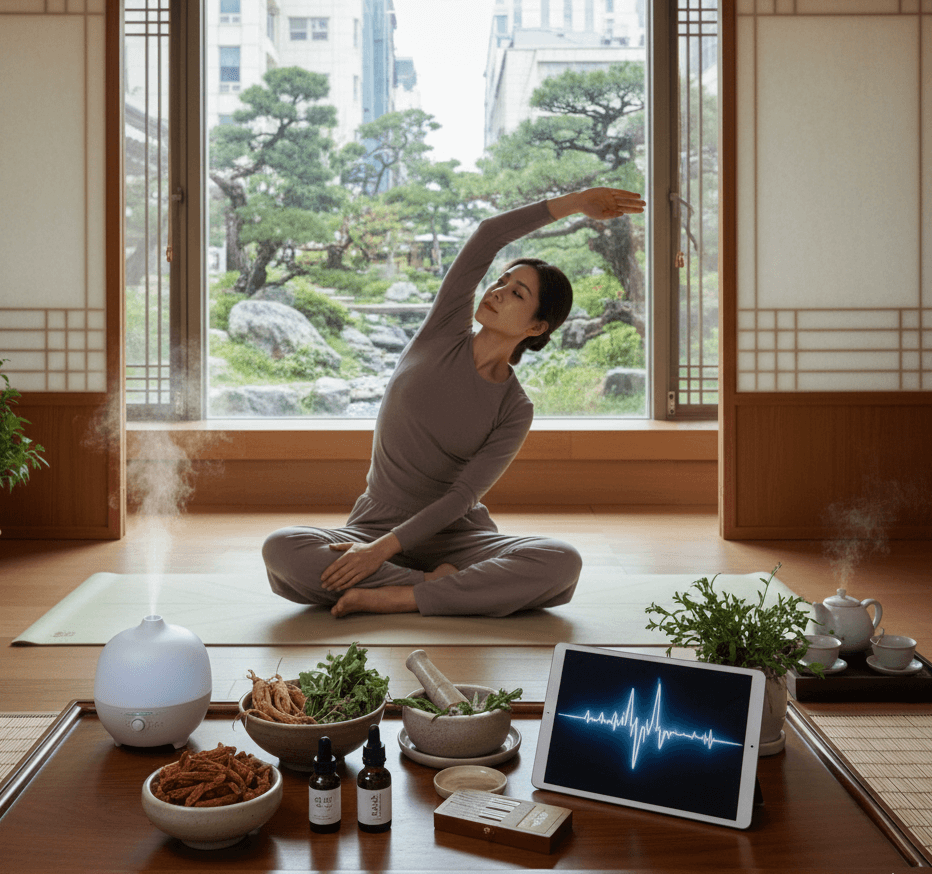Korea is known not only for its vibrant culture and technological advancement but also for the remarkable health and longevity of its people. With one of the highest life expectancies in the world, Koreans have long embraced a way of life that blends traditional wisdom, natural remedies, and modern science. From balanced diets and active routines to deep cultural values that promote mental well-being, Korea offers an inspiring model of healthy living.
➤ Traditional Korean Diet: The Foundation of Longevity
One of the most important reasons behind Korean longevity is the traditional diet. Rooted in balance and variety, Korean cuisine emphasizes fresh, seasonal, and fermented foods that nourish the body from within.
Key features of the Korean diet include:
- ➤ Fermented foods like kimchi, doenjang (soybean paste), and gochujang (red chili paste) promote gut health and immunity thanks to beneficial probiotics.
- ➤ Low-fat meals that focus on vegetables, grains, tofu, and seafood rather than red meat.
- ➤ Rice and soup combinations, such as bibimbap or doenjang jjigae, provide balanced nutrients in each meal.
- ➤ Green tea and barley tea are consumed daily, helping with digestion and detoxification.
The Korean approach to eating centers on moderation and nutritional harmony—a principle called eumyangohaeng, or the balance of elements. This philosophy supports the body’s natural energy flow and prevents chronic disease.
➤ Fermentation: Nature’s Secret Medicine
Fermentation is not just a culinary tradition but a cornerstone of Korean health. Foods like kimchi are packed with vitamins A, B, and C, and their lactic acid bacteria improve gut flora, which is crucial for digestion and immunity.
Research shows that fermented foods may help reduce cholesterol, improve metabolism, and even slow aging by supporting healthy cells. It’s no wonder that kimchi is often called Korea’s “superfood.”
➤ Active Lifestyle and Daily Movement
Physical activity is deeply woven into Korean daily life. While gym memberships are common, many Koreans maintain fitness through simple, consistent movement rather than extreme exercise.
Common practices include:
- ➤ Walking is a cultural norm—Koreans walk to markets, parks, and even after meals to aid digestion.
- ➤ Hiking is a national pastime, with mountains accessible in nearly every city. Regular hiking strengthens the heart and lungs while reducing stress.
- ➤ Morning stretching and group exercises in parks are popular among older adults.
- ➤ Traditional martial arts such as taekkyeon and taekwondo promote strength, flexibility, and discipline.
This steady, balanced approach keeps people active throughout life, supporting both longevity and vitality.
➤ Herbal Medicine and Natural Remedies
Korean traditional medicine (Hanbang) plays a major role in maintaining health naturally. It’s based on the belief that the body must remain in balance with nature.
Popular herbal ingredients include:
- Ginseng: Known for boosting energy, immunity, and mental clarity.
- Reishi mushrooms: Used to strengthen the immune system and combat fatigue.
- Ginger and jujube: Improve blood circulation and digestive health.
- Licorice root and cinnamon: Help with inflammation and stress relief.
Many Koreans drink herbal teas or tonics daily as preventive medicine. These remedies are not just for treating illness—they’re part of a long-term wellness routine that supports vitality and resilience.
➤ Mindfulness and Mental Balance
Longevity isn’t only about physical health. Emotional stability and mental peace are equally valued in Korean culture.
How Koreans maintain mental well-being:
- ➤ Meditation and breathing practices, influenced by Buddhism and Confucianism, help calm the mind.
- ➤ Connection with family and community provides emotional support and a sense of belonging.
- ➤ Nature appreciation—many Koreans retreat to the mountains or temples for rest and reflection.
- ➤ Balanced work-life values are increasingly encouraged, especially among younger generations, as awareness of mental health grows.
Maintaining emotional harmony is seen as essential for a long and healthy life, a concept Koreans describe as jeong—deep, nurturing affection between people that sustains emotional balance.
➤ Modern Adaptation of Traditional Practices
While modern Korea is fast-paced and high-tech, the principles of natural living remain strong. Younger Koreans are rediscovering traditional wisdom through modern wellness trends, including:
- Organic and plant-based diets that echo traditional Korean meals.
- Fermented drinks like kombucha and rice-based probiotics.
- Natural skincare routines using herbal ingredients such as ginseng, green tea, and mugwort.
- Spa and sauna culture (jjimjilbangs) for detoxification, relaxation, and improved circulation.
Even with busy lifestyles, many people prioritize self-care through balanced meals, quality sleep, and mindful relaxation.
➤ Community and Purpose: The Hidden Strength
Social connection is a powerful, yet often overlooked, factor in Korean longevity. Seniors remain highly active within their families and communities, often participating in local clubs, volunteer groups, and temple activities.
A strong sense of purpose and contribution—called ikigai in Japanese but similarly valued in Korea—keeps older adults mentally sharp and emotionally fulfilled. This purpose-driven lifestyle plays a major role in extending both lifespan and life satisfaction.
➤ Clean Environment and Healthcare Support
Korea’s emphasis on public health and environmental cleanliness also contributes to longevity. Regular health checkups, strict hygiene practices, and a focus on pollution control all play their part. The government provides affordable access to preventive care, ensuring early detection and treatment of diseases.
Combined with personal responsibility—healthy eating, exercise, and moderation—these public measures reinforce a strong foundation for long life.
➤ Conclusion
Korean longevity isn’t a mystery; it’s the result of consistent, natural habits practiced over generations. From fermented foods and herbal medicine to mindful living and community connection, Koreans embrace a lifestyle that nurtures both body and spirit.
The essence of Korean wellness can be summed up in three words: balance, moderation, and harmony. By staying close to nature, eating thoughtfully, moving daily, and cultivating inner peace, Koreans continue to prove that living well—and living long—go hand in hand.













